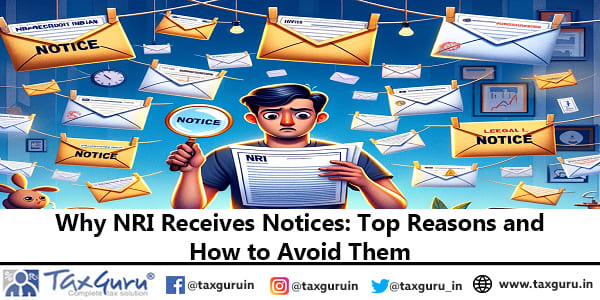Why NRI Receives Notices: Top Reasons and How to Avoid Them
Introduction:
Receiving an income tax notice can be stressful, especially for Non-Resident Indians (NRIs). The possibility of NRIs receiving notices up to 16 years after a transaction, particularly when they can’t recall all the details or lack the necessary documentation, adds to the anxiety. In this guide, we’ll explore the main reasons why NRIs receive income tax notices and provide practical advice on how to avoid them.
Reasons Why NRIs Receive Income Tax Notices:
Rental Income: One of the main reasons NRIs receive income tax notices is because of rental income. Many NRIs own property in India that they rent out, but they often forget to report this income in their tax returns. It’s crucial to remember that rental income exceeding INR 2.5 lakh must be declared, and taxes must be paid accordingly. Filing tax returns annually is essential, even if there aren’t any taxable transactions. Forgetting to file regularly can result in missed transactions, leading to complications.
Interest Income: Another reason NRIs receive income tax notices is due to interest income. Many NRIs forget to declare interest earned from fixed deposits (FDs) held in non-resident ordinary (NRO) accounts. It’s important not to overlook this income, even if you have an NRI FD account.
Income from the Sale of Property: NRIs often forget to file their income tax returns after selling property, assuming that Tax Deducted at Source (TDS) covers their obligations. However, it’s crucial to file returns and declare the sale proceeds, even if TDS has been deducted. Claiming refunds for excess taxes paid may be necessary in such cases.

Sale of Shares and Stocks: Investing in stocks and shares can also result in income tax notices for NRIs, especially when significant profits are realized from long-term investments. Even if the income doesn’t exceed INR 2.5 lakh, filing tax returns and reporting profits or losses is mandatory. Consistently filing tax returns demonstrates compliance and reduces the risk of unforeseen complications.
Conclusion: NRIs must ensure they regularly file their income tax returns, particularly if they have rental or interest income, engage in financial transactions, or sell property or shares. Failure to do so can lead to the hassle of dealing with income tax notices, even years later. By understanding the main reasons why NRIs receive notices and taking preventive measures such as filing tax returns regularly, NRIs can avoid unnecessary complications and enjoy peace of mind.
*****
About the Author: CA Arun Tiwari, a Chartered Accountant and former EY employee, serves as the Chief Consultant of the NRI Desk and Influencer Desk at AKT Associates. He specializes in offering consultancy services tailored for NRIs and is dedicated to creating educational content to raise awareness within the NRI community.





